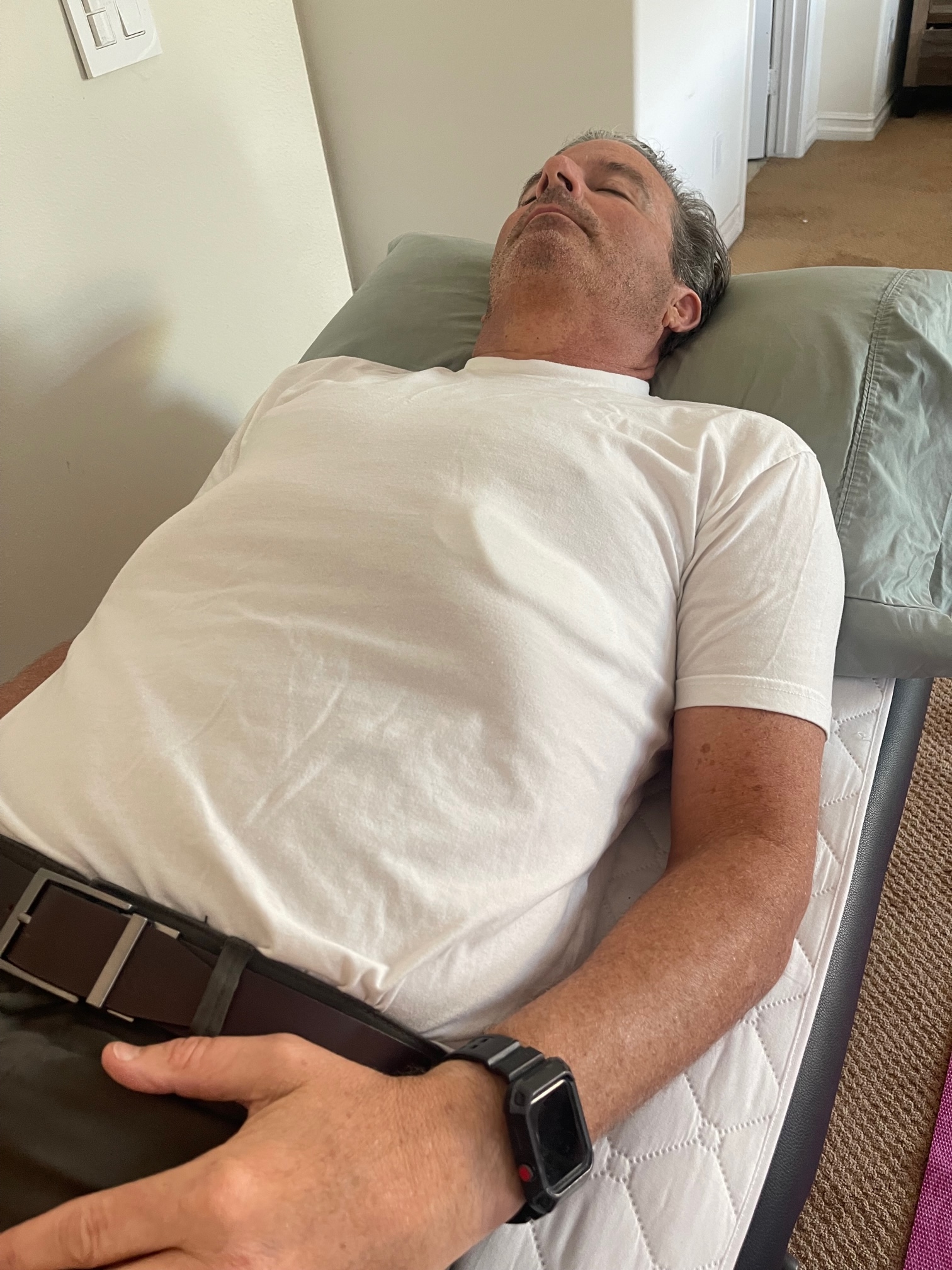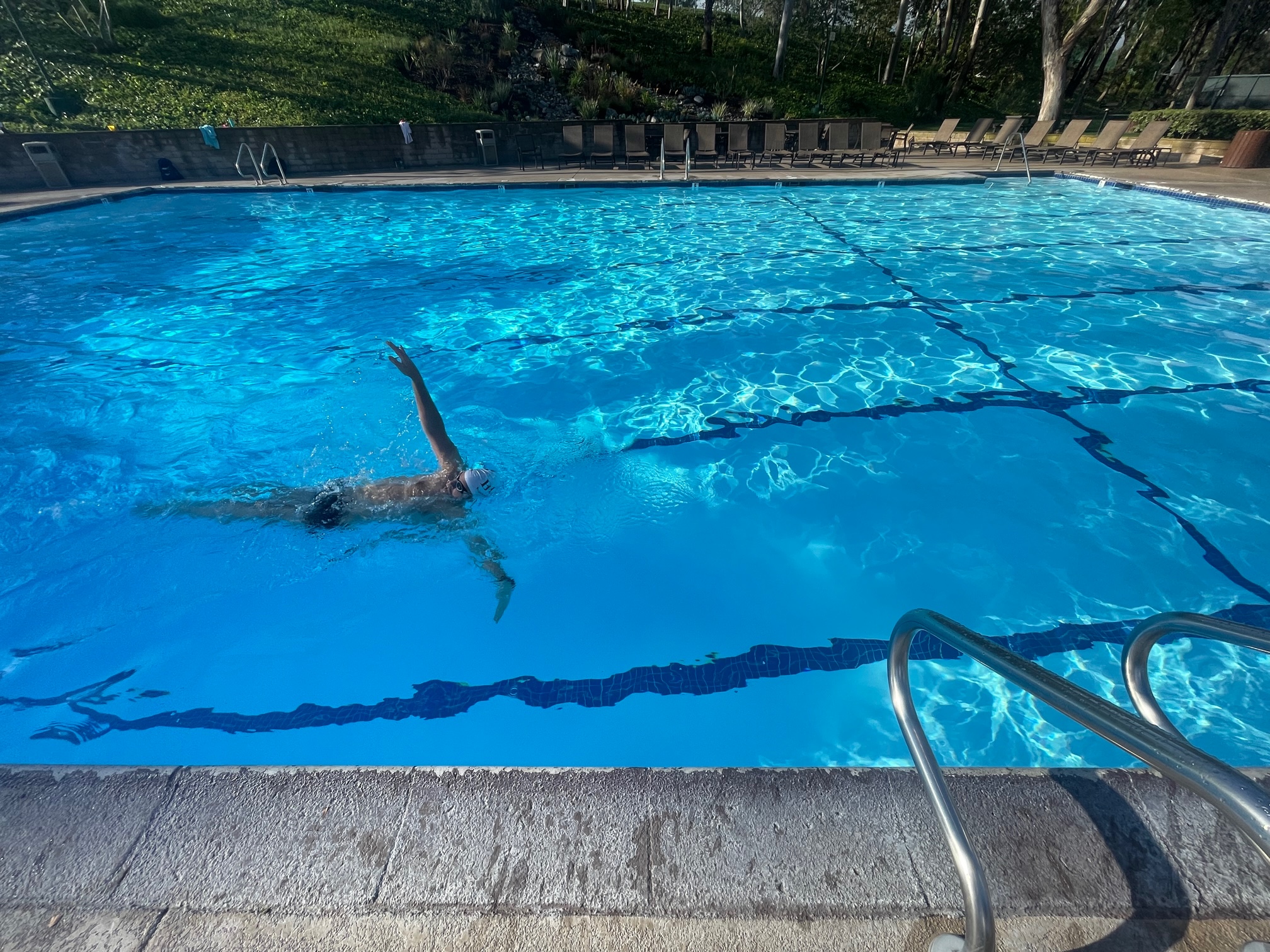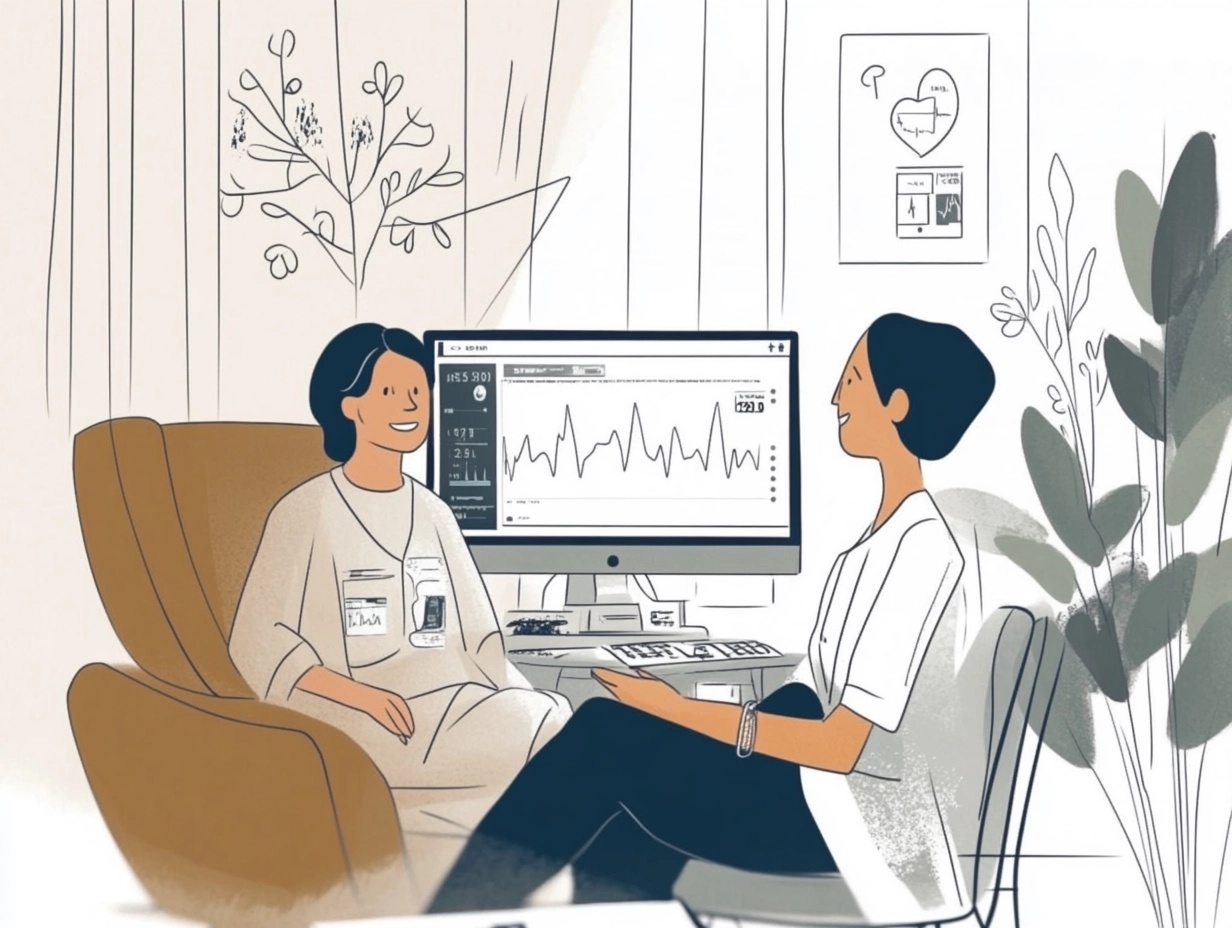Tell me about yourself.
I’m a physical therapist in SoCal. I’ve been recovering from a massive stroke I had in 2020, so Lief has been part of me healing myself. I was doing everything physical, but nothing mental or emotional before. Even though I knew about the science of the nervous system, I just didn’t address it holistically with practices like meditation. I focused more on active fitness practices instead of the psychological. It’s been super enlightening to turn to that now.
How did you become interested in tracking your heart rate variability (HRV)?
I have an Apple Watch so I’ve been tracking my heart rate and other biomarkers as I’ve been recovering to make sure I’m not overworking myself. Just by reading articles, heart rate variability (HRV) kept coming up. I wasn’t that aware of it, so I started reading more about it. I was very intrigued and became more interested the more I read about it. Then, when I started to be able to control my parasympathetic nervous system response, seeing my HRV made an even bigger difference.
How did you discover the Lief Smart Patch?
I just started Googling and the stuff that came up first were the Whoop and the Oura Ring. I kept reading and was trying to find something that would give more real-time data, so I could see immediately what the effects were. I didn’t only want overnight HRV readings, like from the Oura ring. Also, none of the other HRV-related programs offered coaching, and that was important to me to have someone who could answer my questions and give me informed guidance.
How has tracking your HRV with Lief helped you?
It’s affected me in a lot of different ways. Normally I’ve been very Type A and intense, but not really aware of how I’m coming off. But now that I’m focused more on breathing and paying attention to my numbers, my days are more relaxed.

Everyone around me notices I’m a different person. I can use Lief’s Downtime breathing exercise to prepare myself at the beginning of the day, or before I go to bed at night. If I take my time and do my breathing, I notice my sleep is better, and my interactions with other people are better. I used to be so intense, but now my life is more low key.
What do you value most about tracking your HRV continuously throughout the day?
I love being able to see my body’s response immediately. If I’m reacting strongly to a situation, it’s amazing to be able to see how effective I can be at self-regulating with the help of my Lief. Since it’s real time, I can get that feedback immediately. I also like that since the Lief is pretty discrete, no one knows it’s happening if i’m doing a mini-Downtime practice in a meeting. I can try to adjust and change where my numbers are right then and there.
In the last 2 months it’s made a huge difference. For example, normally when I exercise, my HRV is lower, as it should be. This morning I gave myself an off day and didn’t exercise at all, something I wouldn’t have done before, even when I needed a break. My HRV was super high as a result! I would have expected my number to be in the 30’s but it was over 100. Normally I’d feel stressed about not overachieving, but giving myself time to do something and seeing how my body responds, I see that I’m doing the right thing for my body. It’s good to take some time off to recover more quickly.
The approach of being more relaxed has made a huge difference. I understand what my body needs now. The Oura has been a nice complement to my Lief because I like seeing what my sleep is like at night and then using my Lief to play around with my numbers throughout the day, which then impacts my sleep.
I also use my HRV to track my Oura Ring exercises – I saw that the guided exercises increased my HRV a lot more. So I realized that audio guidance was particularly efficient for me. After working on it, I’m seeing that my deep sleep improved from around 18 minutes a night to 1 hour and 38 minutes. I started following all the rules, not eating, making sure it’s dark, etc. I made a few adjustments and it was huge. The reinforcement that my little changes made a huge difference, I was like, “Okay I’m going to put some effort into this.”
Deep sleep is incredibly important after all because of all the healing that happens in the brain. There’s been a humongous improvement in all my numbers. I’ve only been adding in the Oura ring for a week, whereas I’ve been doing the Lief for two months, but I love seeing my numbers improve and playing around with it.
What do you do with your HRV information?
I learned how to take control of my autonomic nervous system so if I’m put in a stressful situation, I have a tool. That’s my goal – that as I go forward, I’ll feel comfortable in any situation, just like I’m preparing myself for bed, now I can prepare myself for situations. I feel like I’m making better decisions because I’m calmer. Everything is better when I’m relaxed. Most of my life I’ve been in fight-or-flight, but that’s changed now.
Because I had my stroke last year – I had a blood rupture in my brain – it gave me a 20% chance of living and 1% chance of living outside the hospital. I was in a coma for 12 days, brain dead. I started at ground zero one year ago. I’ve built myself up again. I’m 53 but I feel like I have a second chance and I’m going about it in a completely different way than before. I was totally paralyzed on my right side, I couldn’t swallow, but you couldn’t tell at all now.
I look like a fit 53 year old. I was very depressed during my early recovery. In my first 3 months I was barely moving and I thought this was my life. But because I’m a physical therapist, I would spend 14 hours a day trying to do something all day long. Sometimes too much. I’m lucky the way it all turned out because my stroke was large. I’ve been able to go headfirst in my HRV because I can participate in the Downtime anytime. It’s been extremely effective to have an opportunity to work on my mind in addition to my body.
Starting the breathing, the breathing has made a huge difference. Getting myself to settle down. I should have been doing that forever. It’s also been very effective for my sister. She’s been meditating a while and didn’t know if it was working for her. Ever since she’s been wearing the Lief, she’s been able to see what’s working versus not working for her and make adjustments. I also like being able to talk to her about my Lief data and bounce ideas off someone else.
What do you value most about the Downtime practice?
I value that I have learned how to take care of myself. I leaned on Lief’s breathing exercises a lot in the beginning. Now, I can control my HRV in the moment by doing the Downtime.
In particular, the last two months, I’ve gotten better and better at learning how to control my HRV. Even if it’s just by closing my eyes, or thinking about something soothing – I’ve noticed that small actions can positively impact my HRV. That’s what I do when I want to change my HRV quickly, but I’m also trying to learn other things. For example, I noticed my HRV actually goes up really high while I’m eating, even though I know that doesn’t happen for most people. It’s interesting and nice to know that eating helps my numbers. My body is adapting so quickly, it’s rewarding to see the numbers change right away.
How did Lief help you with your mental health?
Before I was very high strung and spontaneous and Type A and intense and now i’m much more measured and I don’t get as emotional. I keep myself more level. After the stroke, my brain was very sensitive to irritation, and even before I started Lief, I felt very easily irritated. But since I started breathing with my Lief during the day, most of the day I feel mellow. I just feel calm. Whether it’s driving or there’s a problem, I don’t get wound up the way I did before.
Even something like sharing my story with someone like I’m doing now, I would have gotten very nervous and been super over prepared. But now I’m just low key. Two months ago I was wound up pretty tight. My physical side is really good now, so now in my rehab I want to focus on my breathing and how I’m feeling. It’s been positive on all my relationships and on me. Night time used to be bad for me – after dinner and before sleep felt kind of like a lost time. But now I do my breathing, do the gratitude stuff, and feel happy and good when I’m doing it.
When I wake up in the morning and see my numbers, it’s all good. That mellow feeling I now have throughout the day, I didn’t even notice it until someone else pointed it out. I don’t get stressed out about decisions, I don’t get upset about things like I used to. As long as I’m consistent, I feel like it’s money in the bank. I get my numbers pretty high and then the rest of the day I’m just mellow. It feels like it’s controlled on some level. Same with as my sleep improves, I wake up feeling good instead of all keyed up.
I’ve had to learn what happens with the numbers, like my HRV dips when I’m exercising, which makes sense since I’m in a sympathetic state, but then it goes back to being mellow. I’m learning how my body is responding and I’m learning what it’s supposed to be doing. It’s easy to get frustrated, like why is my number so low right now, but then I know, “that’s healthy, you just exercised for 3 hours!” then I calm down and it goes back up again. It’s okay for my HRV to be low at times, that’s healthy at times.
Tracking my HRV makes me think about how I can prepare myself for new challenges, like giving a presentation or speech. I work with a lot of Olympic athletes, I wouldn’t mind working with neuro-patients like me. In the past, I’d be so nervous about doing a new task. But now my Lief helps me control my nervous system and be less fearful.
Can you share a brief example of how you like to use your Lief in any given day?
I played around with it. I work out in the morning. So normally I’ll put it on right when I wake up so I can see where I’m at. I kinda assess myself before I get out of bed and think about where I’d be in terms of how I feel. Then I have coffee and keep an eye on it. Then when I start my stationary bike I leave it on because it’s not too intense. Then I take it off for elliptical and swimming. Then I leave it on the whole day until night. That’s how I learned how each thing affects my HRV.
In the beginning I wasn’t wearing my Lief in the morning, but now I do and I can see how my sleep quality was in conjunction with my Oura ring. It gives me confidence about where I’m at for the day. And if i’m not good for the day, how am I going to address it? So this morning I wasn’t feeling great, and I knew from the feedback, I should give myself time to rest and recover instead of barreling ahead. I didn’t listen to my mind and body before but this makes me pay attention.
I work with a lot of national and Olympic level athletes. They go through the same thing with stress. How much better could they compete in the competition if they had this feedback data? I’d want to incorporate this into my program. I feel like this is totally overlooked right now. Of course with COVID, everyone is mentally struggling.
People get lost because they’re not sure if they’re doing it right or following through, whereas Lief gives feedback and then they get confidence and then they’ll stick with it more. I feel like this should be mandatory with college students who are usually very stressed! If you could have something to help you step back and have control over your body, that would be amazing.
What advice would you give to others who are just getting started with their Lief?
In addition to Lief’s breathing guidance, early on I would incorporate breathing exercises from the internet. Just laying for 6 minutes and having someone guide me through, at least for me, has been super effective in the last couple of weeks. I think if you start trying to do it all on your own, you might have a harder time moving the numbers. My sister started at an HRV of 11 and then went up to 22. I think the guided audio breathing sessions helped.
Anything else you’d like to share?
I just think Lief is amazing. I found it right when I needed it. It was part of my recovery that I didn’t plan on and that nobody suggested. It just fell into my lap as I was reading about things and it was the biggest part of my recovery because my stroke was in my brain. Here I was working on everything outside my brain, but this is addressing my brain more.





Leave a Reply
You must be logged in to post a comment.